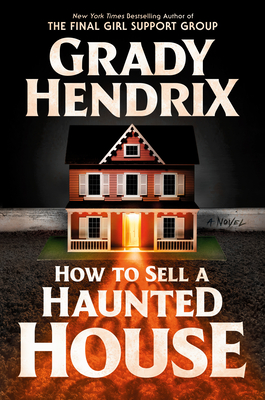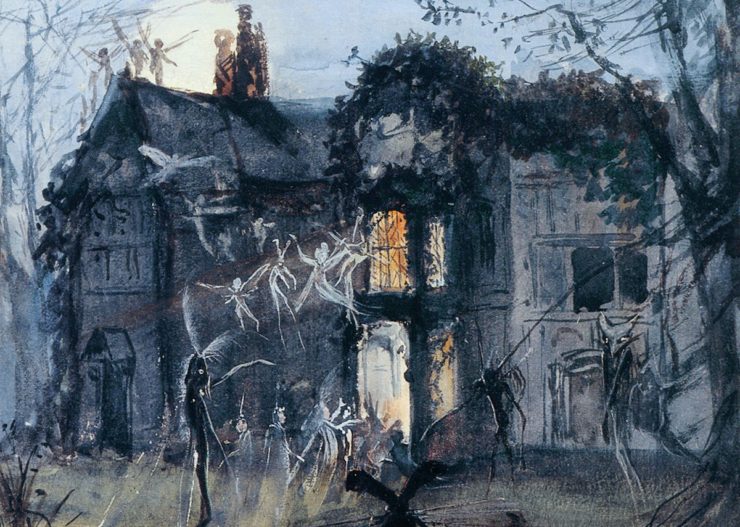They pay no rent. They don’t cover their share of utilities. They make weird noises in the middle of the night. As far as roommates are concerned, ghosts suck. Even worse, once they start squatting in your home, there’s no legal recourse. Consider the four roommates in 1834 Bristol who went to a lawyer to ask if he’d help them break their lease on a flat because they saw a strange blue light and two women floating around dressed in mourning clothes, as well as a woman with blonde hair and gray eyes spotted by one of their daughters. That’s at least seven people in one apartment (eight if you count the daughter, nine if you count the blue light). The lawyer refused their case, so the men went to the local magistrate who told them that ghosts did not exist. One of the men cited John Wesley, the founder of Methodism, as proof that they did. The magistrate told them to get lost.
The moral: never act as your own lawyer when trying to deal with a ghosts. Additional moral: if ghosts are squatting in your apartment, you’re screwed. Millennials think they can’t catch a break in an over-crowded housing market? That’s nothing compared to how the living can’t catch a break in a housing market oozing with overly-entitled supernatural entities who have no respect both for the boundary between life and death, and for contract law.
Ghosts have been a pain in everyone’s ass almost since the dawn of time. However, ancient ghosts mostly seemed to confine themselves to drinking blood and uttering prophecies. During the Middle Ages, ghosts tended to be whiners who pestered the living to recover their drowned corpses and give them proper burials, or else give them absolution for crimes they committed while alive. However, back in those days ghosts understood the value of hard work and occasionally acted as bath attendants, carried heavy loads of beans, and formed armies to help one Duke protect his kingdom from another Duke who didn’t pray as much as the first Duke.
Those values were lost by the 13th century, which brings us our first case of freeloading ghosts. According to the bards, a Scottish woman showed up in Iceland with a really fancy set of linens. She wound up working as a maid, and when she died she asked for her linens to be burnt, but her employer kept them for herself. Almost immediately, the neighbors began to die in awful accidents, then a bunch of ghouls appeared in the main village hall and refused to leave. Every night, they crowded around the fire, making things generally unpleasant and hogging all the good seats. The locals had the bright idea of holding a trial and charging these ghouls with loitering, but the ghouls ignored them. The trial wore on for days, and finally the ghoul leader complained, “We have here no longer a peaceful dwelling,” which is a bit rich, and took off. This was, however, a very qualified victory as the ghouls really shouldn’t have been there in the first place, but then again maybe that woman should have just bought her own sheets.
Elizabethan and Restoration ghosts focused on revenge, but in the 18th century they started messing around with the housing market. In the beginning, it wasn’t actual ghosts that were the problem, it was people pretending to be ghosts. In 1732, Gentleman’s Magazine noted a large number of ghost hoaxes designed to “sink the Rents of a House which an Ousted Tenant has a mind to retake” and the actress and writer Eliza Haywood wrote in 1740 that “Houses have been reported to be haunted out of Malice to those who owned them.”
But as the 19th century began, ghosts became a quality of life issue. In 1818, Mrs. Jervis of Regent Street said that for three years noisy ghosts drew even noisier crowds and kept her from finding a tenant for her rental property. The police dutifully investigated but could not evict the ghosts. In 1828 The Sun reported that due to a ghost sighting on Percy Street it was impossible to get anywhere, and the Bermondsey Ghost Sensation of 1830 attracted up to 2,000 people every night.
Sometimes, these crowds had the right idea. In 1845, a “whole army of little boys” laid siege to a tower in Norwich where a ghost had been spotted, throwing stones at the supernatural entity and threatening to beat it. In June, 1867, when a ghost was reported in Woburn Square, young men began kicking in doors, demanding that the ghost appear so they could thrash it. In 1882, when ghosts were reported at 40 Halsey Street, crowds gathered each week to throw poop and stones at the house, hoping to hit the undead entities. Pity the poor homeowners who are left to clear their yards of poop, stones, and little boys.
But some property owners carpe-ed this diem. William Lowe, owner of the Tiger Pub in Derbyshire, possessed a haunted table that flapped its leaves and hopped around. This attracted large crowds who were eager to see—and possibly throw excrement at—a ghost. Lowe didn’t miss a beat. He merely came up with some drink specials and made out like a bandit getting the rubberneckers loaded. In 1835, the landlord of Lord Hill Pub capitalized on a neighborhood ghost sighting by printing up broadsheets advertising not only the ghost but his own low, low prices. When the crowds came, he cleaned up.
Buy the Book


How to Sell a Haunted House
As early as 1858, haunted houses were advertised as tourist destinations in local British guidebooks, and Charles Dickens actively sought inns and homes where he could experience “sleep molestation.” In a 1907 interview with the Daily Mirror, one West End real estate agent said, “We keep on hand a list of ancient houses which are claimed to be visited with apparitions.” However, the agent reported that these homes were mostly sought by gauche Americans who had extremely classist tastes. “Some Americans are particular…regarding ghosts,” the agent said. “They like one that is an original kind, particularly one that has any historical association. I believe that if you could convince one of these Americans that a certain house was haunted by the shade of Queen Elizabeth, he would pay any price you demanded for it.”
With money to be made from the future audience of The Crown, ghosts began popping up in real estate ads like this one from 1936, “HAUNTED HOUSE for SALE: XVIth-century house in quiet Sussex village: ideal for GUEST HOUSE.” In 1919, several British newspapers carried an ad for the sale of Beckington Castle, claiming that “the place was all the more desirable because it was reported to be haunted.”
And so we see that ghost roommates are ultimately a class issue. If you are a tenant, you are haunted by a crazed supernatural entity that breaks your stuff and frightens your children. If you are a landlord, you suddenly own a valuable commodity. The home where the Perron family lived in Rhode Island, which formed the basis for The Conjuring films, sold for 27% above asking in 2022, and the Stanley Hotel, which is the inspiration for Stephen King’s The Shining, runs a brisk business in ghost tours.
But even among landlords there is a class divide. If you own a run-of-the-mill haunted property, not lucky enough to be featured in a series of blockbuster films, your ghost tenants will cause you to take 50% longer to sell your home, and they will lower its value by 15 – 35%, according to one study. And in more and more states, disclosure laws require you to advise sellers of any reported haunting, making it that much harder to move your stigmatized property. And so we see that ghosts, as we always suspected, are just one more cog in the machinery of economic oppression that perpetuates systemic inequality and destroys social mobility for average Americans everywhere. Thanks, ghosts.
Grady Hendrix is a novelist and screenwriter living in New York City. His latest book, How to Sell a Haunted House, appears on January 17, and you can learn more dumb facts about him at gradyhendrix.com.










